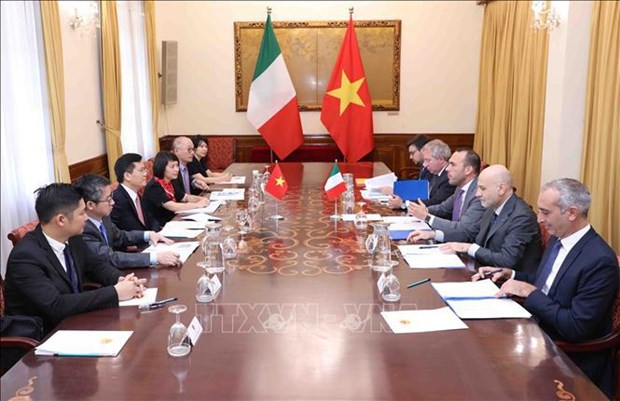
At the occasion (Photo: VNA)
Hanoi (VNA) – Deputy Minister of Foreign Affairs Ha
Kim Ngoc and Italian Deputy Minister of Foreign Affairs and International
Cooperation Manlio Di Stefano on June 8 co-chaired the 4th political
consultation throughout the framework of the 2 nations’ strategic partnership.
Lauding important progresses recorded within the
relations over the previous time, notably in politics-diplomacy, economic system, and
science-technology, each officers agreed to additional strengthen the bilateral
cooperation in such new spheres as well being, atmosphere, local weather change
response, and renewable vitality.
Ngoc acknowledged Vietnam values and needs to beef up its strategic
partnership with Italy, commending the perimeters’ sound collaboration in
implementing their plan of motion for the partnership for 2021-2023.
He instructed Italy quickly ratify the EU-Vietnam Investment
Protection Agreement (EVIPA) and assist the European Commission in eradicating its
‘yellow card’ warning in opposition to unlawful, unreported, and unregulated (IUU)
fishing for Vietnamese seafood.
In response, the Italian deputy minister mentioned Italy
considers Vietnam a prime precedence cooperation accomplice within the area and appears
for extra joint works within the fields of innovation, aerospace, hydrogen vitality,
and cybercrime prevention and management.
He additionally praised the nations’ mutual assist throughout the
COVID-19 pandemic, with Vietnam presenting Italy over 300,000 face masks and
Italy aiding Vietnam almost 3 million doses of COVID-19 vaccine.
The sides agreed to extend the trade of high-level delegations,
proceed implementing bilateral cooperation mechanisms, and work towards the realisation
of two-way commerce at 6 billion USD in 2022 and 10 billion USD within the following
years.
They mentioned they may work collectively in data trade
and assist one another at worldwide and multilateral boards.
They additionally emphasised the significance of guaranteeing the liberty
of navigation, overflight, safety and peace within the East Sea and of respecting
worldwide legislation, together with the 1982 United Nations Convention on the Law of
the Sea (UNCLOS)./.
